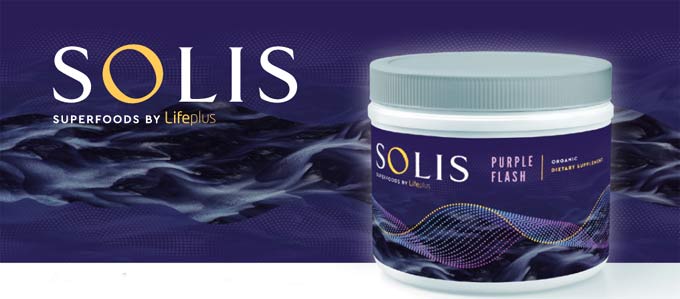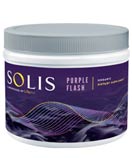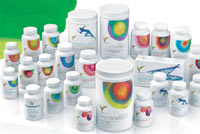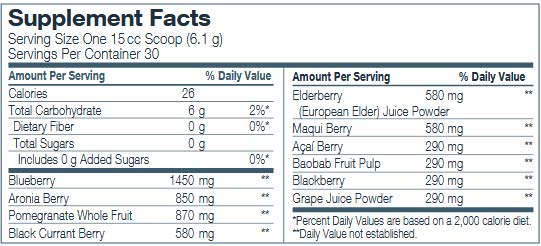| Blueberries (Vaccinium cyanococcus)...are a well-known superfood fruit, quite rich in anthocyanins, with a particular reputation
as "brain food" Indeed, the title of a recent clinical trial (published in July of 2018) done with extracts of both blueberries and grapes (also included in this product) states the conclusion of the research: “Polyphenols From Grape and Blueberry Improve Episodic Memory in Healthy Elderly with Lower Level of Memory Performance: A Bicentric Double-Blind, Randomized, Placebo-Controlled Clinical Study”. The biggest improvement in supporting healthy memory was in healthy elderly people who had the lowest level of memory performance.
Blueberries, like all superfoods, support many functions crucial to health and resiliance, especially with reference to handling the stresses of modern life and aging. Despite being a sweet treat, blueberries have also been shown to support healthy blood sugar metabolism.
Blueberries also benefit the human intestinal microbiome. An interesting study from Sweden illustrated that blueberries eaten together with probiotics increased the levels of butyric acid (a short chain fatty acid) in the large intestine. Butyric acid is one of the primary foods for the cells lining the intestine and we are now learning that it enhances our immune defenses through the blood stream as well. Eating blueberries plus probiotics supported healthy intestinal function and increased the number of healthy lactobacilli species present in the intestine.
Pterostilbene is an antioxidant which is found in blueberries (and is a close cousin to a better-known compound called Resveratrol). Pterostilbene, anthocyanins, and many of the compounds found in these superfood fruits belong to a family known as polyphenols. Blueberries also contain high levels of delphinidin (a specific type of anthocyanin), which has been shown to support healthy lipid metabolism, and healthy blood sugar and insulin function. In addition to the positive impact of blueberries on cardiovascular and gastrointestinal health, blood sugar, and healthy cell growth, there are also studies detailing blueberries’ positive impact on supporting joint health, brain health and a healthy inflammatory response in relationship to exercise.
Aronia berries (Aronia melanocarpa), also known as black chokeberry, are recognized as having one of the highest contents of phenolic compounds among various kinds of berries. Aronia contains high levels of proanthocyanidins, flavanols, anthocyanins, flavonoids (quercetin glycosides), chlorogenic acids, caffeic acid, triterpenes and fibers. Extracts of aronia berries have been shown to support healthy blood pressure thus supporting already healthy cardiovascular function.
Studies have also shown that aronia berries and their extracts improve the function of endothelial cells (the cells that line our arteries), by improving their ability to make nitric oxide, an essential signalling molecule that helps the arterial system to relax, thus promoting healthy blood pressure and healthy blood flow. Aronia berries have been shown to promote healthy blood pressure and healthy endothial function. In animal models, this effect of improving endothelial function and hence healthy blood pressure and blood flow, has been documented many times.
Clinical trials in humans have also shown that aronia berry interacts with the human microbiome in specific ways, and stimulates the growth of organisms associated with healthy circulatory function.
Pomegranates (Punica granatum) have been used as food since Biblical times, and even much earlier than that. Containing over 100 phytochemicals, they are an extraordinary mix of polyphenols and other compounds that protect the body from oxidative stress (but cause oxidative stress in abnormal cells). Pomegranate juice contains higher levels of antioxidants than most other fruit juices, and boasts three times more antioxidant activity than either red wine or green tea. In addition to vitamins C and E, pomegranate juice is a good source of folate, potassium, and vitamin K.
The antioxidants in pomegranate juice can help ‘quench’ free radicals, protect cells from damage, and promote a healthy inflammatory and immune response.
Pomegranate fruit is quite rich in dietary nitrates and nitrites, which can be easily converted by the body to nitric oxide, a primary signaling molecule in the body for dilating arteries, leading to better circulation, healthier blood pressure responses, and improved physical performance—both athletically and sexually. In one study, young male bicycle athletes found that, after taking a pomegranate extract daily for 2 weeks, they were able to exercise nearly 100 seconds longer before reaching exhaustion which, in the demanding sport of cycling, can be the difference between winning and losing a competition. The potent oxygen free radical scavenging activity of this fruit supports healthy intense exercise function as well as healthy muscle function and recovery, improves whole body strength and feelings of vitality, and supports healthy blood flow and oxygen delivery, thereby supporting healthy athletic performance.
Punicic acid, a fatty acid found in pomegranate seeds is one of the many constituents of pomegranate that maintain healthy blood lipids already in the normal range, as well as support healthy blood pressure already in the normal range. Perhaps even more importantly, pomegranate polyphenols decrease oxidative stress which can oxidize blood lipids, such as LDL and HDL cholesterol.
Pomegranate extracts have also been shown to support healthy learning and memory, especially in older people. A clinical trial was conducted, giving eight ounces of pomegranate juice daily to people who had a problem with their memory. After a certain period of time, significant improvement was noted in both verbal and visual memory.
Pomegranate fruit also supports healthy promotion of the levels of Akkermansia municiphila in the human intestinal microbiome. Robust levels of this member of the complex human microbiome have been strongly associated with a healthy gut inflammatory response, as well as supporting healthy weight. The microbiome benefits of pomegranate fruit and juice are linked to the bioactive compound known as ellagitannin
Black Currant (Ribes nigrum) a small, perennial shrub native to central Europe and northern Asia, is cultivated throughout the world, including the United States, and has long been used as a food in many different traditions. Modern laboratories have demonstrated the potent ability of black currants to support a healthy immune response and lower oxidative stress throughout the body, all of which are beneficial in supporting health throughout many systems of the human organism.
The properties of black currants are conferred from its biochemical constituents, some of which include anthocyanins (specifically delphinidin-3-O-glucoside, delphinidin-3-O-rutinoside, cyanidin-3-O-glucoside and cyanidin-3-O-rutinoside), flavonols (including proanthocyanidins), polyphenols and polyunsaturated fatty acids. Many scientific studies have been published with regards to its various health supportive applications.
Adding to the inherent antioxidant activity associated with the rich supply of polyphenolic and anthocyanin compounds within black currants, they also stimulate the production of antioxidant enzymes produced in the body, including glutathione (GSH), peroxidase, and superoxide dismutase by unknown mechanisms. Like the other members of this formulation, black currants also support the vascular endothelium and its crucial ability to produce and modulate nitric oxide to maintain healthy blood pressure and healthy blood flow.
Black currants also support a healthy oral microbiome, helping to maintain balance within it. As mentioned previously, black currant and its extracts support a healthy and robust immune response, with very strong responses noted in various laboratory models, though these have not yet been documented with human clinical research.
With regard to eye health, multiple studies have established that the cyanidins present in black currants support rhodopsin (a pigment in the retina which is central to healthy vision) regeneration and dark adaptations. This has the effect of supporting healthy vision. In addition, anthocyanins cause arteries to relax, which can increase blood flow to the eye and reduce fatigue to support healthy eye function.
Berry juice has been used to modulate urinary pH. In one study by Kebler and coworkers, black currant juice was found to alkalinize the urine and increase the excretion of oxalic acid..
Black elderberry (Sambucus nigra) is another food that has been used for thousands of years. Our ancestors quickly realized that black elderberry provided significant value in supporting and maintaining health, especially healthy respiratory function. Black elderberries must be cooked to deactivate toxic lectins, and the dried extracts of cooked black elderberries retain the complex polyphenolic matrix of the cooked berries.
The effects of black elderberry are likely linked to its high polyphenol and anthocyanin content and its potential to mitigate oxidative stress (antioxidant effects) and/or enhance nitric oxide (NO) production. Thus, similar to pomegranate fruit extracts, black elderberry, in addition to its legendary supportive effects on a robust immune response and healthy lung function, also enhances athletic activity, maintaining healthy blood pressure responses to strenuous exercise, and enhancing ability to maintain such exercise for longer periods of time than for athletes not supplemented with black elderberry fruit extract. In one randomized placebo-controlled study of athletes given 650 mg of black elderberry extract before a one-hour training run, showed a significantly lower lactic acid increase in the supplemented group.
Lactic acid is produced when there is insufficient oxygen present to support mitochondrial production of energy. Production of lactic acid during extreme exertion results in the burning sensation often felt in active muscles. This painful sensation forces a recovery period in which the body clears the lactic acid and other metabolites. So clearly, nutrients that decrease lactic acid build up during prolonged strenuous exercise may well result in improved training and competitive advantages.
Studies by Youdim et. al. published in 2000, in the journal Free Radical Biology and Medicine Vol. 29 No.1 ; Pp.51-60, actually showed for the first time with laboratory culture of human endothelial cells (those that line all of the over 60,000 miles of blood and lymphatic vessels that every human carries), that elderberry anthocyanins can actually be incorporated into human endothelial cell membranes, thus dramaticaly increasing protection against oxidative stress. Diets and supplements rich in antioxidants also help to maintain healthy inflammatory and immune functions which are crucial to maintaining vigorous health and slowing biological aging.
Maqui berries (Aristotelia chilensis) are purple-black berries native to Chile and Argentina, and contain a rich variety of anthocyanins, which create the dark blue, purple, and black hues of many types of berries. While all anthocyanins have strong antioxidant activity, the delphinidins represent the most potent antioxidant compounds within the anthocyanin family. The richest natural source of delphinidin is the maqui berry.
Several health benefits of maqui berry extract have been documented, including increasing tear fluid production in people who tend to not produce enough, as well as maintaining healthy blood sugar levels. A glycoside of delphinidin (delphinidin-3-O-glucoside) which is also present in maqui berry extracts has been shown to decrease platelet ‘stickiness’ and therefore supports healthy blood circulation.
Açai berries (Euterpe oleracea) have been known around the world as a superfood for well over a decade. They have been used as food in the Amazon rainforests of South America, particularly in Brazil. Açai berries have a dark purple skin, yellow flesh, and a large pit. Because of the large seed (similar to an apricot), they are not technically berries, but are often referred to in this way. To make them edible, they are soaked to soften the tough outer skin and then mashed to form a dark purple paste.
Fresh açai berries have a short shelf life and aren'’t available fresh outside of areas where they are grown. For export, they are sold as a frozen purée, freeze dried powder, or pressed juice. Freeze drying preserves the amazing spectrum of nutrients in this superfruit better than other methods.
Açai fruit pulp has a unique taste that’s often described as a cross between blackberries and unsweetened chocolate. Commercially the frozen purée has often been mixed with caffeine, giving the idea to consumers that the fruit produces energy. Some açai purées have large amounts of sugar added to them as well. As with all dark purple foods, açai is very rich in anthocyanins, as well as containing significant amounts of healthy fats (6.5%), low levels of sugar (2%), and are also both trace and macro mineral-rich.
Clinical studies have shown that the antioxidant compounds in the fruit are highly bioavailable when eaten.
Animal model research with açai indicates activity that assists weight loss, as well as provides significant protection to the brain, particularly the tiny structure called the hippocampus, which is the primary seat of memory. Clinical studies of açai in humans still need to be done to see if these activities translate into similar benefits in humans, in support of healthy weight, healthy mood, and healthy memory.
Blackberries (Rubus fruticosis) have been part of the human diet for at least 2,500 years as documented after being found in the stomach contents of an ancient Danish woman whose body was found preserved in a bog. Although quite common, blackberries do indeed deserve inclusion in the ‘superfood’ group.
They are nutritionally dense, with high levels of vitamin C, fiber, vitamin K, and manganese. One cup of blackberries contains 62 calories, 13.8 grams of carbohydrates, 1 gram of fat and 7.6 grams of fiber, thus contributing only 6 grams of ‘net carbs’ per cup (and those carbs are very ‘low glycemic’, meaning they transfer into blood glucose very slowly—at about one quarter of the speed of refined carbohydrates).
Of course, their dark color (they are actually a very dark purple which appears black) indicates that they are also loaded with anthocyanins, and other polyphenolic compounds which are beneficial to human nutrition.
Blackberries, like many of the superfoods included in Purple Flash, support healthy endothelial function. Endothelial cells make up the inner lining of blood vessels, and free radical scavenging molecules such as cyanidin-3-O glucoside support protect this critical vessel lining, as well as its ability to promote nitric oxide production by endothelial cells, which as mentioned earlier is a key signaling molecules in coordinating the contraction and relaxation of the smooth muscles in arterial walls to maintain healthy blood flow.
In addition to healthy vascular function and blood circulation, blackberry anthocyanins help support healthy DNA function.
Regarding cognitive benefits of blackberry, a study done at the USDA Human nutrition research center on aging at Tufts University and published in 2013 showed that the polyphenolic compounds in blackberries help support healthy motor and cognitive activity. Regular consumption of blackberries (along with other berries) may prove useful in supporting healthy memory performance as well as healthy behavioral and neuronal functions.
Blackberries are a source of both insoluble and soluble fiber. Insoluble fiber in blackberries encourages absorption of water in the large intestine and adds bulk to the stools. This aids in regular bowel movements, freedom from constipation, and overall digestive health. Soluble fiber, also known as a ‘prebiotic’ supports the growth of beneficial microorganisms in the human intestinal microbiome, which we now know plays multiple roles in maintaining human health.
The low amounts of sugar and properties that also help maintain healthy insulin levels make blackberries very useful in healthy weight management. Effective cleaning of the bowels, owing to the fiber content in blackberries, and very low calories make it an excellent component of low carbohydrate diets.?The rich content of anthocyanins in blackberry make it a heart-friendly fruit. Other useful components such as magnesium and fiber present in blackberries help maintain a healthy flow of blood, thus supporting cardiovascular health. Magnesium, in blackberries, also helps in supporting healthy blood pressure and heart rhythms.
The highly bioavailable magnesium, vitamin K, calcium and phosphorus aids both in promotion of a strong skeletal system, and also support healthy cellular functioning. Blackberries are also a good source of lutein, which is a carotenoid essential in protecting the sensitive macular area of the retina from short wave ultraviolet light. Anthocyanosides and vitamins present in blackberries also support healthy vision as we age.
Blackberries are also very beneficial for pregnant women. Rich in reduced and methylated folates, blackberries contribute to the healthy growth of fetal cells and tissues. Essential minerals such as calcium, iron, magnesium, and phosphorus present in blackberry also support healthy maintenance of bones in the developing baby, as well as help maintain bone health in the expectant mother.? Blackberries are a tasty treat as well as a nutrient-dense option for snacking or adding to salads and other dishes during pregnancy.
Baobab (Adansonia digitata L.) is a powerhouse of nutritional value used in Africa as food and in support of health as far back as the dawn of humans on earth. It is found throughout regions of Africa and is becoming increasingly recognized for its high nutrient and polyphenol content. Baobab fruit pulp is rich in procyanidins and flavanol glycosides.
Studies have shown that as little as 1.8% baobab fruit pulp content baked into white bread signficantly reduced rapidly digestible starch from white bread samples. In addition, baobab fruit pulp increases the bioavailability of minerals from other foods (such as moringa leaf, another highly nutritious staple food throughout portions of Africa) that it is often combined with.
Laboratory studies in an animal model of liver injury by carbon tetratchloride (a known potent liver toxin) have also shown that the water-soluble portion of baobab fruit strongly supports healthy liver function. The mechanism of this healthy liver support activity is currently unknown, but has been speculated to be related to one or more compounds in baobob fruit, including triterpenoids, beta-sitosterol, alpha and/or beta-amyrin palmitate, or ursolic acid.
Baobab pulp is high in vitamin C, niacin, vitamin B6, antioxidants and several key minerals like potassium, magnesium, iron and zinc. Twenty grams of the dried fruit pulp powder supplies one gram of protein and 16 grams of carbohydrate, nine grams of which are fiber, which functions as a prebiotic (food for the human microbiome of the intestine). Prominent in the non-fiber portion of the carbohydrate are large polysaccharide molecules, which laboratory research has revealed have potent free radical scavenging (antioxidant) activity, and also promote healthy inflammatory and immune responses.
Grape juice powder (Vitis vinifera) Grapes are typically rich in anthocyanins, flavanols (particularly flavan-3-ols also known as catechins), flavonols, proanthocyanidins, and stilbenes (primarily resveratrol, which is found in highest concentrations in grape skin, some of which is extracted into the juice, and also found in red wine).
There are 21 anthocyanins that have been identified in purple grapes. Flavonoids from even a modest serving of purple grape juice can contribute substantially to the total daily intake of polyphenols. As with other anthocyanin and polyphenol-rich purple fruits, there is ample evidence that even modest intake of purple grape juice (1-2 ounces) supports endothelial function and nitric oxide production, as indicated by improvements in flow-mediated dilation (FMD).
Emerging science suggests, as is the case with other anthocyanin/polyphenol-rich fruits and their extracts, that grape juice powder also helps to support healthy cognitive and immune function, in addition to supporting cardiovascular health.
Summary
Together, these 10 ‘superfood’ ingredients, make a ‘Super Boost’ – a complex mix of 100% organically grown concentrates, globally and sustainably sourced, incredibly nutrient dense, with a very low glycemic index (the speed at which this complex food generates blood glucose), and with synergistic activities that overlap to such a degree that the whole is greater than the ‘sum of the parts’.
Delicious, simply mixed in still or carbonated water, and highly versatile in terms of adding it to smoothies, Daily BioBasics, the Lifeplus ‘Be’ products, or even as a dessert topping! Purple Flash truly fits the description ‘Delicious and Nutritious’. Due to inadequate research regarding consumption of aronia berries and black currants in early pregnancy, it would be prudent to avoid supplementing with Purple Flash until the mid-second trimester of pregnancy.Boost your morning, day or night (or all three), and pay attention to what you experience within a few weeks. In combination with a whole-food, plant-rich diet, an active lifestyle, good stress management, social connectedness and fulfilling work, Purple Flash will support health throughout all the stages of human life.
These statements have not been evaluated by the Food and Drug Administration. This product is not intended to diagnose, treat, cure or prevent any disease.The choice is yours. We invite you to see how you enjoy it most!
|









